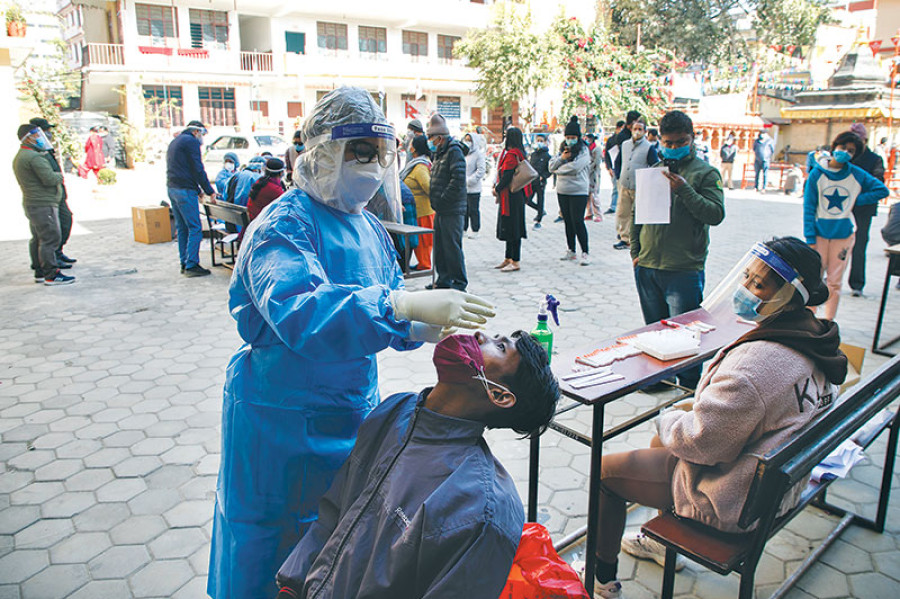Health
Experts question indiscriminate use of Covid-19 antigen tests
Mass testing without contact tracing and use of new technology for precise testing doesn’t help contain the virus, they say.
Arjun Poudel
After stopping free polymerase chain reaction testing for Covid-19 and completely halting contact tracing, the Ministry of Health and Population has now launched a rapid antigen testing campaign.
The campaign, which was started on Monday in the Kathmandu Valley, will also be launched in major coronavirus hotspots throughout the country, according to the Epidemiology and Disease Control Division.
“We will conduct antigen tests at all major Covid-19 hotspots across the country,” Dr Basudev Pandey, director at the division, told the Post. “This will help the government in its attempt to contain the spread of coronavirus.”
Public health experts, however, have expressed their concerns, saying the campaign has been launched without setting proper goals for such tests.
They have also questioned the relevance of antigen tests, which have a turnaround time of around 10-30 minutes but aren’t as reliable as the reverse transcription polymerase chain reaction (RT-PCR) tests—the gold standard for Covid-19 testing with a turnaround time of a few hours.
The government, however, says that antigen tests are also cheaper than PCR tests.
The campaign doesn’t make sense when authorities concerned have already given up the fight to contain the spread of coronavirus by halting contact tracing, experts say.
“Why are we conducting mass [antigen] testing when we are not resuming contact tracing and testing asymptomatic people who have come in close contact with infected people?” said an official at the Department of Health Services, asking not to be named because he feared retribution. “Tests should be carried out to contain the spread of the infection. But we are conducting them just for the sake of it.”
Doctors said the antigen tests being used by the government is 85 percent accurate in the case of symptomatic patients and only 60 percent in that of asymptomatic ones. This means that 40 percent of infected people who do not show symptoms of the disease could be misdiagnosed.
As per the protocol prepared by the Health Ministry, polymerase chain reaction tests are needed for symptomatic patients, even if an antigen test yields negative results.
“Polymerase chain reaction tests are required to avoid false negatives in both symptomatic and asymptomatic cases,” Dr Prabhat Adhikari, an infectious disease and critical care expert told the Post. “These days, we can perform polymerase chain reaction tests at the price of antigen tests if we use new technologies, which are cost effective and at the same time reliable.”
Public health experts have been urging authorities to use several other technologies such as direct polymerase chain reaction test, loop-mediated isothermal amplification (LAMP), and Genexpert machines, generally used for tuberculosis tests. Experts say LAMP technology does not even require a biosafety level-2 lab and tests can be conducted in the field.
“The government argument that it wants to control the spread of the coronavirus by conducting antigen tests at a time when contact tracing has been stopped just does not add up,” an official at the National Public Health Laboratory, told the Post who also spoke on condition of anonymity because he was not allowed to speak to the media.
Some officials even likened the antigen tests to tossing of a coin. “It would be better to toss the coin as it does not cost money,” said the official. “This shows that controlling the spread of infection is not not the government’s priority.”
Contact tracing, according to health experts, holds the key to containing the spread of the coronavirus. But it has been halted after the ministry enforced the October 5 Cabinet decision not to provide free tests and treatment to all.
Later the government agreed to resume free testing and treatment after a Supreme Court ruling, but in the new guideline, it included the provision that free services will be provided only to people who show symptoms of the disease.
Meanwhile, more people are dying of the disease and the infection has even spread even to the remotest areas of the country, including Humla, following a halt in contact tracing.
As of Wednesday, 236,246 people have tested positive for the disease throughout the country, with 1,538 deaths. In the last 24 hours, 1,490 people tested positive, including 723 in the Kathmandu Valley. The ministry said that 218,161 people have recovered so far.
“This new campaign seems to have been launched just to consume the antigen test kits they purchased by spending millions of rupees,” Dr Mingmar Gyelgen Sherpa, former director general at the Department of Health Services, told the Post. “The authorities would not have halted contact tracing, and they would have tried to explore alternatives to lessen the price of polymerase chain reaction tests if they were indeed serious about containing the spread of infection and saving lives.”




 9.2°C Kathmandu
9.2°C Kathmandu















